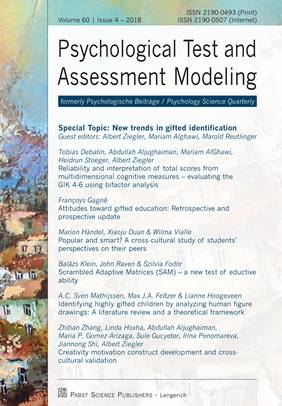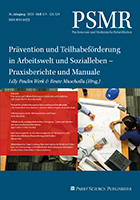Special Topic: New trends in gifted identification - Part I
Guest editors: Albert Ziegler, Mariam Alghawi, Marold Reutlinger
Reliability and interpretation of total scores from multidimensional cognitive measures – evaluating the GIK 4-6 using bifactor analysis
Tobias Debatin, Abdullah Aljughaiman, Mariam AlGhawi, Heidrun Stoeger, Albert Ziegler
PDF of the full article
Attitudes toward gifted education: Retrospective and prospective update
Françoys Gagné
PDF of the full article
Popular and smart? A cross-cultural study of students’ perspectives on their peers
Marion Händel, Xiaoju Duan & Wilma Vialle
PDF of the full article
Scrambled Adaptive Matrices (SAM) – a new test of eductive ability
Balázs Klein, John Raven & Szilvia Fodor
PDF of the full article
Identifying highly gifted children by analyzing human figure drawings: A literature review and a theoretical framework
A.C. Sven Mathijssen, Max J.A. Feltzer & Lianne Hoogeveen
PDF of the full article
Creativity motivation construct development and cross-cultural validation
Zhitian Zhang, Linda Hoxha, Abdullah Aljughaiman, Maria P. Gomez-Arizaga, Sule Gucyeter, Irina Ponomareva, Jiannong Shi, Roland Grabner, Paula Irueste, Paromita Roy, Albert Ziegler
PDF of the full article
Reliability and interpretation of total scores from multidimensional cognitive measures – evaluating the GIK 4-6 using bifactor analysis
Tobias Debatin, Abdullah Aljughaiman, Mariam AlGhawi, Heidrun Stoeger, Albert Ziegler
Abstract
It is often not trivial to interpret total scores from test batteries of cognitive ability, as the underlying set of items or subscales is typically not unidimensional. Additionally, in such cases, the reliability is not accurately estimated by coefficient alpha. The rarely addressed problem and possible solutions via bifactor analysis are presented without mathematical details. Applying this technique, factor structure and model-based reliability of the cognitive ability part of the Gifted Identification Kit 4–6 (GIK 4–6), a newly developed test battery to identify gifted students in the United Arab Emirates, were evaluated using confirmatory bifactor analyses. Results revealed that the total score is reliable (coefficient omega = .89) and primarily measures a general intelligence factor (g). The total score should best be interpreted as a blend of g, a reading factor, and a mathematics and science factor.
Keywords: reliability, bifactor analysis, cognitive ability, validity, unidimensionality
Tobias Debatin
Department of Educational Psychology
and Research on Excellence
Friedrich-Alexander University Erlangen-Nuremberg
Regensburger Straße 160
90478 Nuremberg, Germany
tobias.debatin@fau.de
Attitudes toward gifted education: Retrospective and prospective update
Françoys Gagné
Abstract
Aiming to assess attitudes toward gifted education (ATGE), the author and his graduate students created in the 1980s an attitude survey named Opinions toward Gifted Education (OGE); it soon became the researchers’ instrument of choice, and has remained so since. But, a recent re-examination of that instrument by this author has revealed major psychometric weaknesses. Consequently, he proposes a program of empirical studies that would lead to a new instrument offering both better effectiveness (reliability and validity) and efficiency. The author also recommends extending that research program to a recently empirically explored related subject, namely the assessment of attitudes toward academic acceleration. A second research program, also conducted by the author and his graduate students in the 1980s, aimed to identify the best causal sources of individual differences in ATGE. It led to two seminal studies: (a) a comprehensive literature review of analysed predictors, followed by (b) an empirical verification of the predictive power of ten of the most ‘promising’ variables. These two studies have not been replicated since; yet, the field of gifted education would definitely benefit from their replication.
Keywords: attitudes, gifted education, psychometrics, attitude predictors, OGE questionnaire
Françoys Gagné
8340 rue Odile
Brossard QC J4Y 2W4, Canada
fysgagne@gmail.com
Popular and smart? A cross-cultural study of students’ perspectives on their peers
Marion Händel, Xiaoju Duan & Wilma Vialle
Abstract
The present study aimed to investigate adolescents’ expectations of successful peers in three different school subjects with particular consideration of the effects of gender and country. We investigated whether students from three different countries, namely China, Germany, and Russia, held different expectations of their successful peers in the school subjects of mathematics, languages and sports. Gender differences were studied with regard to participants’ gender and the gender of the successful peer. Participating students were asked to imagine a fictitious female/male classmate who was the highest achieving student in the respective school subject in the previous year. Students indicated their expectations about the new classmate in relation to social status and eagerness. The results clearly demonstrate for all three subjects of mathematics, languages, and sports that the premise that it is possible to be “successful and still popular” is true for Chinese students but not for German and Russian students.
Keywords: cross-cultural, gender stereotype, peers, perception, academic performance
Marion Händel
Department of Educational Psychology
and Research on Excellence
Friedrich-Alexander University Erlangen-Nuremberg
Regensburger Straße 160
90478 Nuremberg, Germany
marion.haendel@fau.de
Scrambled Adaptive Matrices (SAM) – a new test of eductive ability
Balázs Klein, John Raven & Szilvia Fodor
Abstract
Inspired by the Raven’s Progressive Matrices a new, innovative, IRT-based online adaptive test, the Scrambled Adaptive Matrices (SAM) has been developed and used in talent identification projects both in educational and work settings with more than 15 000 participants. The current article introduces the test and shows results on reliability and validity as well as response time, motivational concerns, adaptivity, security and the effects of external variables such as socio-economic status, age, gender and pre-selection. The data show that the newly developed instrument is a feasible, reliable and valid tool for ability assessment and talent identification in projects of all sizes.
Keywords: computerized adaptive testing, intelligence, item response theory, Raven Progressive Matrices, validity
Balázs Klein
University of Pécs
Research Center for Labor and Health Sciences
Hungary
balazs.klein@gmail.com
Identifying highly gifted children by analyzing human figure drawings: A literature review and a theoretical framework
A.C. Sven Mathijssen, Max J.A. Feltzer & Lianne Hoogeveen
Abstract
There are still many problems in identifying highly gifted children, and professionals are in need of alternative identification procedures. Human figure drawings (HFDs) have since long been used in diagnostic assessments, but their use as an alternative identification instrument for highly gifted children has not been examined thoroughly yet. In this article, the possibilities to use HFDs as an instrument with which highly gifted children can be identified are explored. A brief history of giftedness and research on children’s drawings is presented. Cognitive functioning, creativity and social-emotional functioning, and the possible expression of these psychological characteristics in drawings are discussed. Based on the literature reviewed, a theoretical framework is presented, in which suggestions for the analysis of HFDs for identification purposes are made. This involves going beyond the traditional method of computing drawing-IQ’s when analyzing HFD’s. This theoretical framework forms the basis for a research program that should eventually result in a well-founded diagnostic screening instrument to be used in the identification of highly gifted children.
Keywords: highly gifted children; human figure drawings
A.C. Sven Mathijssen
Center for the Study of Giftedness
CBO Talent Development
Toernooiveld 100
6525 EC, Nijmegen, the Netherlands
s.mathijssen@ru.nl
Creativity motivation construct development and cross-cultural validation
Zhitian Zhang, Linda Hoxha, Abdullah Aljughaiman, Maria P. Gomez-Arizaga, Sule Gucyeter, Irina Ponomareva, Jiannong Shi, Roland Grabner, Paula Irueste, Paromita Roy, Albert Ziegler
Abstract
We conceptualized creativity motivation (CreMo) as the force (high-quality experience, instrumental purpose, and value) which drives individuals into creativity-related behaviors shown so as to do, learn, and accomplish new things. Based on the CreMo theory, we developed the creativity motivation scale (CMS) accordingly and tested its reliability, structural validity, and cross-cultural validity on multi-national samples in six countries: Chile (N=407), China (N=475), Kosovo (N=395), Russia (N=385), Saudi Arabia (N=335), and Turkey (N=381). Nine CMS items showed a high internal consistency in each country. Confirmatory factor analysis (CFA) model comparison results suggested the CMS three-factor model is statistically superior to the one-factor model and the second-order model. Multigroup CFA (MGCFA) results provide evidence of the measurement equivalence of factor structures, factor loadings, and factor variances and covariances across six country groups. Educators, psychologists, and researchers may find the CMS a useful tool for measuring individuals’ creativity-related behavior dispositions, as well as explaining the force behind them. Immediate future research should focus on exploring the relationship between the CreMo and other creativity-related factors.
Keywords: creativity, motivation, creativity motivation, CFA, MGCFA
Zhitian Zhang
Department of Educational Psychology
and Research on Excellence
Friedrich-Alexander University Erlangen-Nuremberg
Regensburger Straße 160
90478 Nuremberg, Germany
zhitian.zhang@fau.de
Psychological Test and Assessment Modeling
Volume 60 · 2018 · Issue 4
Pabst, 2018
ISSN 2190-0493 (Print)
ISSN 2190-0507 (Internet)























